I am just as fascinated by the business of making tabletop games as I am by the experience of playing them.
Even before I began my role as a contributor here at Meeple Mountain back in 2021, I was always curious about what it takes to make a board game, from the spark of an idea in the head of a game designer all the way to the time that game gets to my table.
These questions created more questions when I began to visit publishers. I had the chance to visit the headquarters of Capstone Games a few years ago and quickly grasped the scope of what it really takes to push a new game into the marketplace. Thousands of individual decisions are made before a game even gets through a development cycle, let alone the logistical challenges of getting a game produced, shipped and distributed through various channels.
I wanted to start a series of articles that gives the average enthusiast more chances to understand the volume of things happening outside of simply buying a game—and that’s when our Inside the Box series was born. Using our extensive list of contacts in the tabletop industry, team members will occasionally spend a day in the offices of different companies to provide a sense of what it might be like to work in tabletop. How do people find these jobs? What do various people do in both full- and part-time tabletop jobs? What are some of the perks? What are some of the downsides? What are some of the projects these companies are working on?
Inside the Box is a new endeavor for us, so we’d love your feedback as we build future content. We’ll try to profile publishers, manufacturers, distributors, marketers, and more specialist shops that employ designers, artists, and/or other members of the tabletop supply chain.

Let’s Go to…Hungary!
Mindclash Games is the publisher behind a number of highly thematic Euro-style strategy games, including Anachrony, Perseverance: Castaway Chronicles—Episodes 1 & 2, and Voidfall. Mindclash released their first game, Trickerion: Legends of Illusion, in 2015 and recently launched a crowdfunding campaign to celebrate the game’s 10-year anniversary with a shiny new edition bundled with a new expansion. Mindclash has one of the most loyal followings in tabletop, thanks in large part to the quality of their catalog alongside a strong focus on the worldbuilding aspects of their core titles. This approach has set them apart from many of the other heavyweight strategy games released over the last decade.
There was one thing I didn’t know about Mindclash prior to meeting some of the team for the first time at the US game convention Gen Con a few years ago—Mindclash is headquartered in Budapest, making them the only Hungarian publisher I have covered. Further, Mindclash is firmly focused on making games for the international community, so most of their games are not printed in Hungarian, at least, not initially. Typically, Mindclash products appear in Hungary only after working with various localization partners.
That makes for a unique situation. I thought it would be fun to start the Inside the Box series with the Mindclash team, in part to give me an excuse to fly myself to Budapest and visit their offices. (The magic moment? When I made the pitch to Mindclash CEO Viktor Peter during a late-night “fourthmeal” in Germany last year, and in-between bites of a pile of Chicken McNuggets, Viktor blurted out “are you serious?” when I told him I would pay my own way to make the trip.)
Once I arrived in Budapest, I spent my first night in town with some members of the team chatting over dinner—eating Hungarian staples like chicken paprikash, langos, and oven-baked stuffed sour cabbage—and talking about the state of Mindclash’s business before spending a full day in the office to do a “vibe check” and learn more about the roles each person plays within the organization.
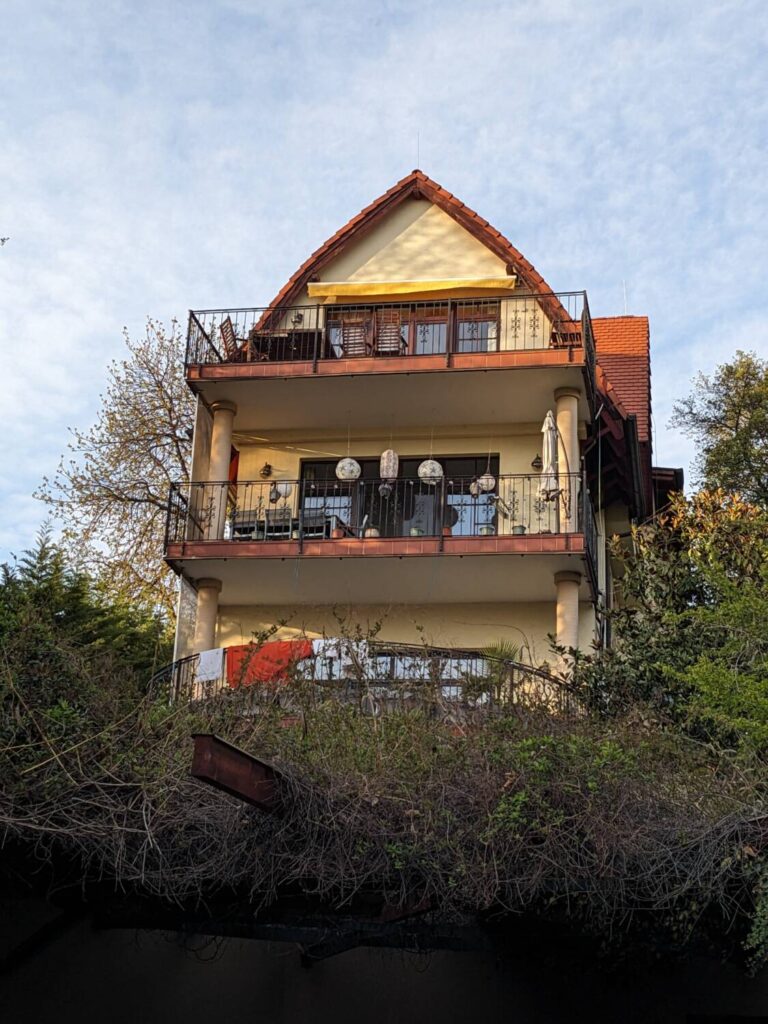
That office? Well, this part is pretty wild: Mindclash HQ is on one floor of a house just outside the city center in Budapest. When I got the address, I walked from my hotel downtown and rolled up to a house that looked like any other house on a very handsome city street. There was no sign on the gate that this is where games like Voidfall, Septima and the upcoming back half of the Perseverance games were polished by an in-house development team.
After being buzzed into the building’s entrance, I was welcomed inside and offered slippers to take a quick tour. (No shoes allowed, just like my house.) Everyone sits at a desk in one of the four bedrooms and office spaces on the floor. There’s a cute kitchen area stocked with snacks, including gluten-free options for those who need them. A communal table in the middle of the living room serves double duty—it’s the place where everyone eats lunch together, and it’s a large-enough table for the team’s art director, the high energy (and charmingly profane) Villő Farkas, to spread out and update sketches for the team’s upcoming games. A television and an Xbox system rest nearby, waiting to get that familiar tap on the proverbial shoulder just in case anyone needs to take an afternoon break.
Now that I have spent a little time in Budapest, it was fun to see how Hungarian culture plays into the way Viktor and his team balance the culture of the team. This is true with not only the way Mindclash designs games but also how they go about the business of working with manufacturing and localization partners, managing relationships with the media, and pricing games for campaigns, amongst dozens of other tasks.
It was also intriguing to see something common amongst the majority of the publishers I have gotten to know over the last few years: Mindclash does all of this with a small full-time staff, a team of just eleven people.
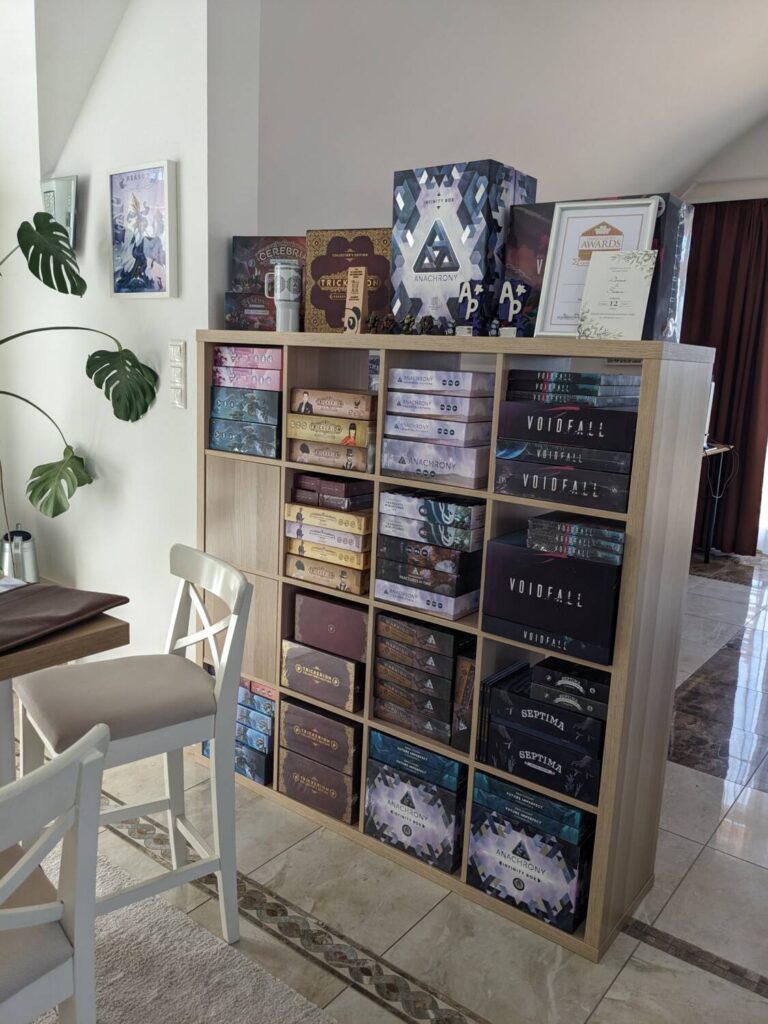
Agile, Indeed
Viktor worked with an HR consulting team three or four years ago because he wanted to find more ways to build an efficient organization. After a number of sessions, Mindclash decided to manage projects using the Agile methodology and made Villő a Certified Scrum Master, or CSM. (Another common theme in the tabletop industry: everyone wears multiple hats.)
Twice a week, the team conducts “stand ups” where team members provide updates on their specific tasks within a project. Mindclash, like some of the teams I used to work with when I was in the professional services and IT consulting space, uses two-week sprints to finish cycles. Based on the needs of upcoming project deliverables, priorities pivot as needed.
All this mumbo jumbo means that Mindclash was less organized as they pushed games out the door in the early stages of their existence, and now they are super organized. Even though it may seem to an outsider that publishing two, maybe three, games a year shouldn’t require this level of organization, Viktor and his team will tell you differently. And I agree, now that they have told me differently.
Even in the best of times, it takes a well-oiled machine to not only publish new games, but also have a CEO and at least two other team members that have served as designers and/or developers of the games in the Mindclash catalog. And that’s before we talk about the games in the catalog that Mindclash continues to support; who steps up when a customer reaches out because they are missing a few components of one of their games? The Mindclash community is loyal, which means they are always tracking the company’s news on socials. Someone has to regularly manage communications between Mindclash and their fan base, as well as media partners like me who want to cover more Mindclash games and stay up on company news.
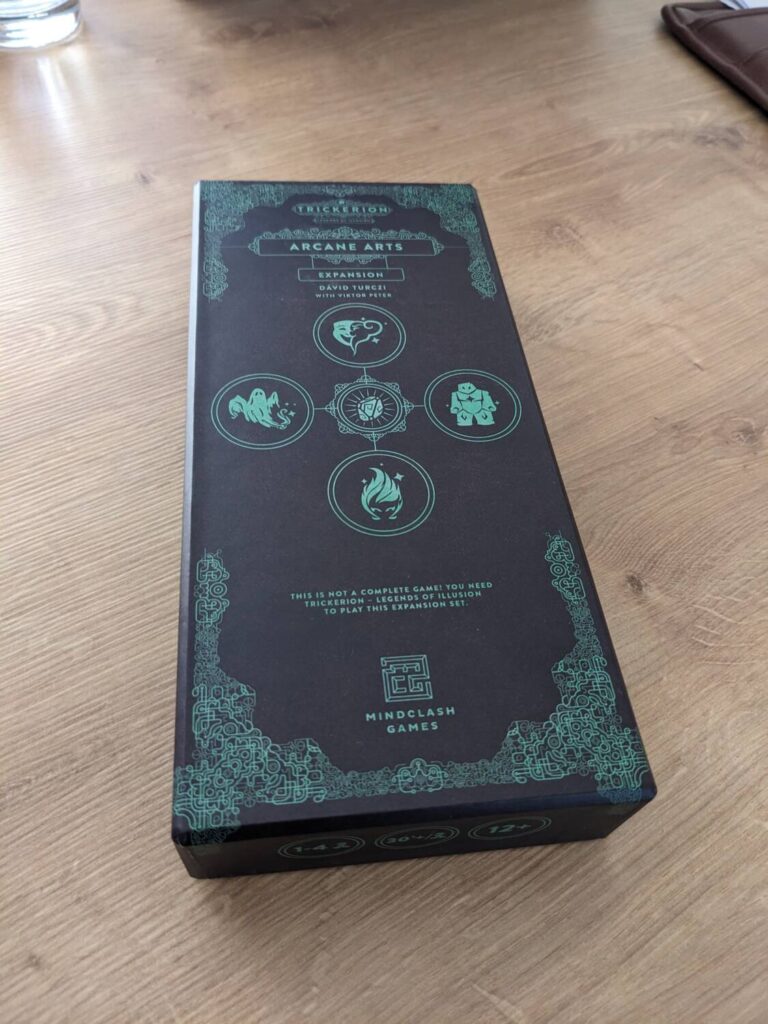
Maybe you’ve heard about all this business regarding tariffs? Yes, someone (and likely multiple “someones”) must sweat those details in real time, while also working with manufacturing partners to discuss every component down to the last millimeter. Mindclash releases both retail versions and deluxe versions of the games in their core line, so considering costs to ensure the company can stay above water after a 145% tariff kicks in has suddenly become a vital part of the ways tabletop companies can do business.
Amidst all the things that are aligned with running a business and designing games in-house, Mindclash also takes pitch meetings with outside designers, to ensure that Mindclash can balance new in-house titles with titles they can shape using their design philosophy. Some team members spend time at conventions and other forums to meet designers, playtest new games, and sign new titles, while also shaping their own in-process titles to ensure they meet the high standards they have set for themselves.
Luckily, Viktor and his team also take time to ensure they take a breather here and there, so once a month, they have a teambuilding activity that kicks off on a Friday. The activities range widely—movies, dancing, dinners, game nights. Yes, even people in the gaming business who don’t play a lot of games still carve out a night from time to time to ensure they play a game, and Mindclash team members recently did a night with the CGE game SETI: Search for Extraterrestrial Intelligence. (In-house reviews were very strong.)
This gives the Mindclash team a chance to really jell. Spending the day with seven of the eleven team members really cemented what I saw when spending time with Mindclash at other shows, most notably at some of the after-hours parties at SPIEL in 2023 and 2024. The group is always together, and one can tell that these are authentically strong relationships. That’s important, because when you spend entire days together in an office that is basically on one floor of a house just outside of the Budapest city center, you better enjoy each other!
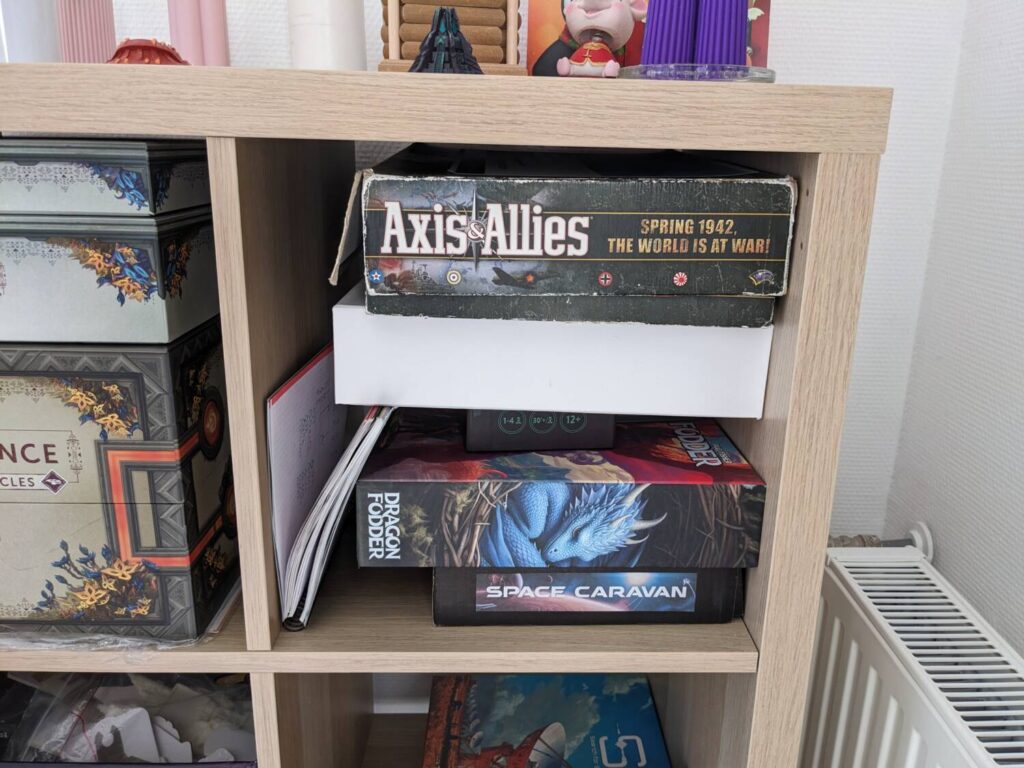
A Day in the Life
Mindclash team members typically come to the office twice a week—Tuesdays and Thursdays. They made an exception for my visit, because I wanted to visit on a Friday. The majority of the local team members came by for a day that started around 9 AM and ended for various team members between 3 PM and 6 PM. When I left the building at 6, a couple of people were still working on various tasks.
The hot action when I visited was the upcoming release of the 10-Year Anniversary Edition of Trickerion: Legends of Illusion, Mindclash’s first published game. The new edition is timed with the release of what might become the final expansion for Trickerion, Arcane Arts, which (unlike the base game) was designed by David Turczi, the man quickly becoming the Reiner Knizia of prolific modern-day tabletop design work. (Even Knizia might roll his eyes at that reference, since Knizia himself seems to put his name on a new title every week.)
Dorka Peter, the Community and Social Media Manager at Mindclash, was busy tracking the followers for the campaign and collaborating with Viktor (Dorka’s brother) on the messaging that will go into the campaign as well as the language that will be built into other communications in the run-up to the campaign kickoff. Tünde Máté, the Operations Manager, spent part of the day exchanging emails with production partners and team members at Panda Game Manufacturing, the logistics partner for Mindclash’s current and prior projects. For at least a few hours in the afternoon, Villő had pencils, paper and a large straight-edge on the large table, refining what looked like images for the final artwork for the alternate Trickerion board.
Other work was in motion. Mihály Vincze, the co-lead developer who helps lead Mindclash’s in-house development team, was working on various projects, including a game or two that I can’t talk much about here that the world can expect to see in 2026. Vincze, who led my demo of Voidfall when I first met him in Essen back in 2022, has an interesting backstory: he is a game designer who has a real passion for breaking games, helping to shape them to a point where they are not only playable, but then eventually interesting. (This takes a lot more work than you think!) Vincze’s main focus right now is finalizing the rules for Revenant, the Voidfall spinoff worker placement game that is being readied for production later this year.

A lot of the chatter on my day in the office was tied to “Blaze”, the in-house code name for the next Mindclash Play title. For less-dedicated fans: Mindclash Play is the team’s attempt to bring medium-weight, affordable titles to a mass market audience. While we didn’t discuss specific sales numbers, my sense is that Mindclash Play has thus far been a mixed bag—the first two titles, Astra and Ironwood, may or may not have sold well, but these titles trumpeted Mindclash’s intentions to unlock a more balanced sales audience.
It’s hard to market and sell $150-$200 deluxified games every year, even when the games are as good as the ones Mindclash has delivered so far. A game like Astra gives the team a chance of delivering titles that are quicker and easier to fulfill with pre-orders and retail point-of-sale transactions, as opposed to the traditional crowdfunding approach of the bigger titles.
Blaze has everyone on the team excited. One staffer thinks that Blaze is their favorite Mindclash game. Multiple people think that Blaze is the Mindclash Play title that most fully realizes the original vision of the sub-brand: a family-weight rules load, exceptional-yet-affordable production, a title that a core Mindclash fan would still enjoy thanks to a theme-first approach and immense replayability, all in a package that plays in 60-90 minutes. (For the record, I thought Astra was so-so; my man Andrew Lynch thought Ironwood was fantastic.)
The cycle for a game like Blaze is markedly different for the Mindclash team, and it was discussed that way during my visit. The game is done—in this case, the design and development work are essentially finished—and all that needs to happen now is the game’s announcement, which will launch in parallel with pre-orders for fans who want to order direct. Like the other Mindclash Play titles, it will also be coming to retail later this year. Viktor, Dorka and others spent some time briefly discussing Blaze while Tünde and Réka showed off some of the prototype’s components.
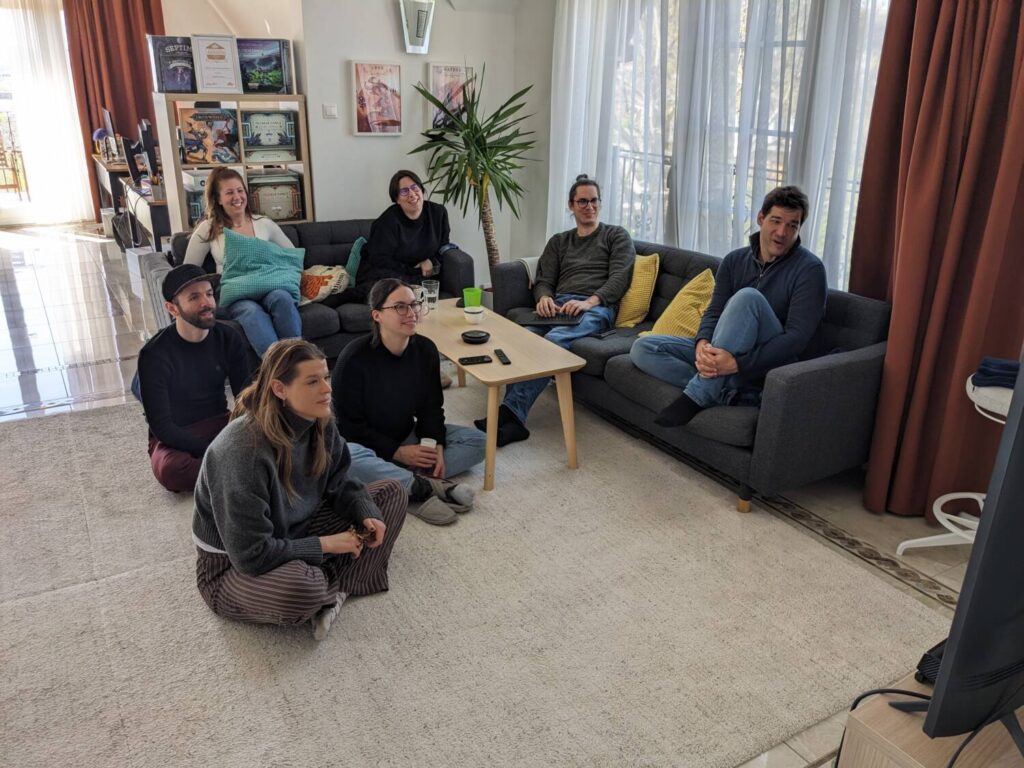
One of my favorite moments of the day came during the lunch hour. The team often hits a cantina-style restaurant nearby, and sometimes they order in so that they can focus on the day’s deliverables. It was great to see the team settle in with burritos from a nearby Mexican joint while talking about their plans for the weekend. The staff speaks both Hungarian and English, and I told everyone that they were welcome to totally include me or exclude me based on the topic, so there was a lively mix of conversation, some of which I didn’t catch, and other bits that I did.
As it turned out, lunch was just an appetizer. Every day when staff is in the office, they spend 20-30 minutes doing a mix of trivia games on the living room TV to stay fresh for the afternoon. (I have never thought to do this, which means I normally find myself nearly asleep at 2:30 PM every day. Who knew?) The Mindclash team mainly claims to not play a lot of board games, but what I saw heavily contrasts this notion…these folks are competitive, man.
The rapid-fire approach kicked off with a quick game of Wordle (as far as I can tell, the five-letter-word format is in English everywhere, which wasn’t an issue for the Mindclash team). Other games came in quick succession, many of which seemed to use Wordle as their base: Spotle (guess the musical artist), Boardgamle (guess the board game by only seeing a pixelated version of the box cover, BGG 500 only), Moviedle (guess the movie, while seeing the entire film in just one second), and Bandle (guess the song, one instrument at a time). My favorite, though, was TimeGuessr: seeing only one picture from a moment in history, guess the year and the location down to the square mile (in this case, kilometer). I can already think of dozens of friends who need TimeGuessr in their lives, if it isn’t a part of it already!
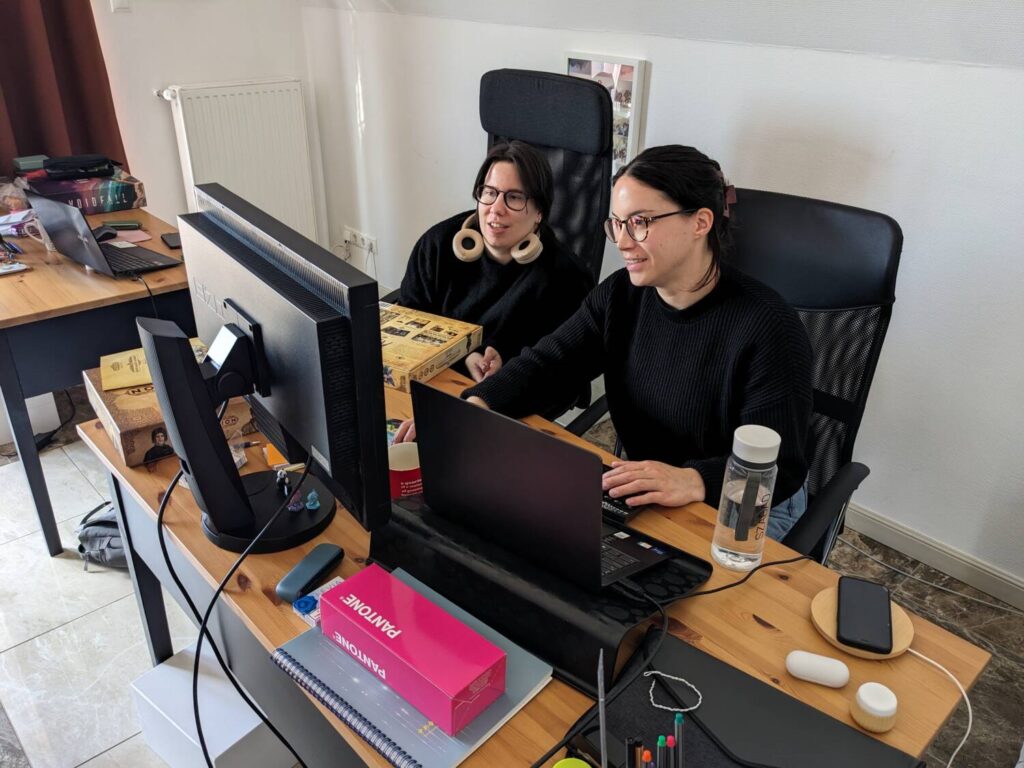
Ocean’s Eleven (Minus a Body or Two)
I had met six of the seven people in the office at previous shows, but my office visit was the first time I really had the chance to sit down and learn more about the team. (Mindclash has a team of eleven, before you consider contractors in a variety of flavors, playtesters, influencers, and community organizers.) While I wanted to catch everyone, Attila (who I think goes by “Atesz”) had to leave before I could chat with him, because he was leading a ballroom dancing session in the city later that evening. That’s right—a board game junkie, off to teach dance classes.
Réka is the team’s Customer Service Manager. Her backstory: Réka was doing work supporting the then-new Disney+ service, working in customer support with users in the US and the UK. I asked her if anyone does better than America when it comes to being angry and rude on the phone. “Americans do angry and entitled better than maybe anyone!” she joked, and I had to agree. If that experience steeled Réka when it came to the role with Mindclash, it has certainly helped when customers reach out via email with missing component requests or have general questions.
Réka is more of a video game junkie than a board game enthusiast, but she plays games from time to time outside of work. (Some favorites: Cat Lady, Forest Shuffle, and a two-player-only game I had not heard of before, Osztaly-Harc. Réka’s favorite Mindclash game is Perseverance, Episode 3.) At work, Réka often playtests games to feel out the solo modes. That means Réka is somewhat of a genius. Anyone who can handle the solo rulesets from designers like Turczi is a hero, right?
Tünde is the team’s Operations Manager. While studying international relations in school, Tünde worked part time at an escape room and realized that she really enjoyed the “gamified nature of puzzle solving.” (While Tünde’s favorite Mindclash game is Septima—”100%, Septima”—she also likes the game Harmonies.) During a five-month stretch where she was working as an assistant at a Hungarian media company, she looked for something new and found her initial role with Mindclash on a Facebook post, a post seeking a part-time office manager.
What does it really mean to be the Operations Manager at Mindclash? “Basically, I am responsible for production…I talk to manufacturers every single day. Spec sheets, components, the materials, sampling, everything that comes with that, is what I do. Freight shipping, logistics…I book flights, hotels, and other convention logistics as well. Accounting, light graphic design for the marketing materials, and anything else that needs doing if others are not available. I also do localization; working with other translation partners and getting updates submitted on time and the right way.”
What do you love most about working here? “I never imagined it would turn into something like this after four years…I really love the team, and we are close—maybe TOO close!—and it is not easy to find a place where you are genuinely friendly with everyone. We don’t do drama, and the environment is very creative here.”
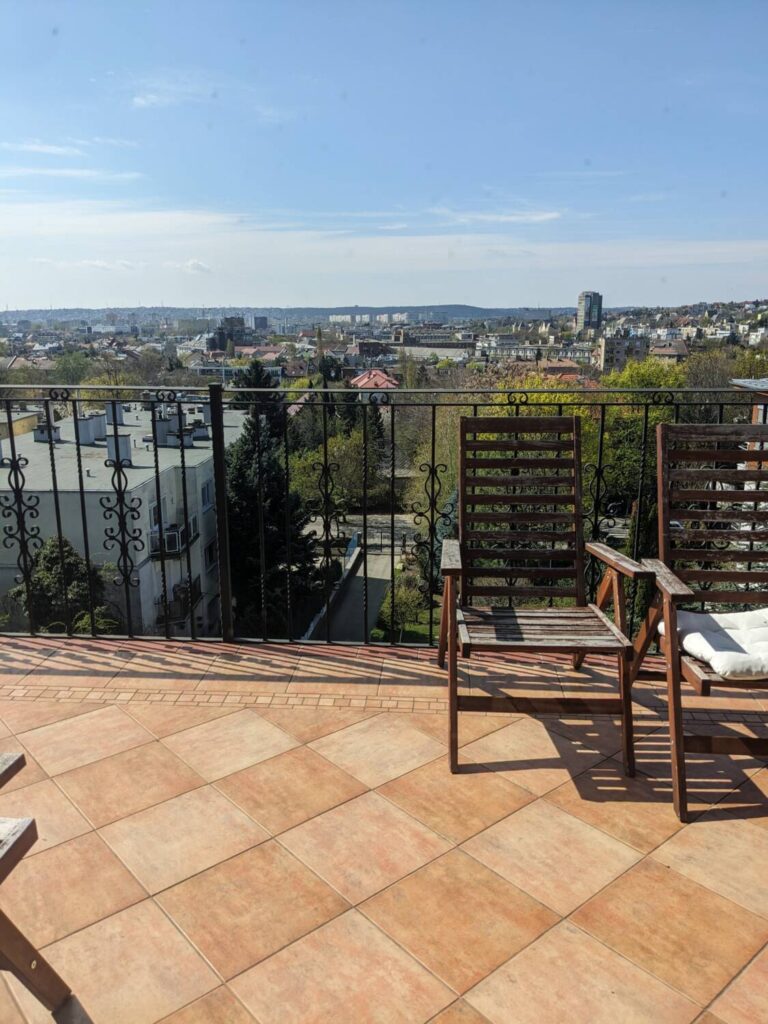
In terms of the process of shaping a game, I think Mihaly (nickname: “Mityu”) holds an exceptionally important role on the team as the co-lead developer at Mindclash. Mityu is a designer who worked with David Turczi on a couple of games, including [redacted] (the actual name of the game!) and Days of Ire: Budapest 1956. That network is what initially got him connected to the Mindclash team a few years ago.
I think the main place where I see games go wrong is when a finished product doesn’t feel like it has successfully gone from “the game works” to “the game works, and it is fun, and it works because it is so much fun.” Even when a game’s mechanics and ruleset are light, I think it is just as hard to develop it into a great game as when the rules load encompasses three rulebooks’ worth of pages, in the case of games like Voidfall. With Mindclash’s core games, I think it’s an extra level of challenge because these are such rules-dense experiences.
While Emmy Pratt was one of the proofreaders on that manual—and I have called out my great appreciation for Emmy’s work before, along with her husband Robert, who does B2B sales for Mindclash and is their sole US-based employee—Mityu wrote the Voidfall rulebook and is the only person with final credit. Writing the rulebook for this game alone would have been a full-time job for most people, but a game like Voidfall required so much more, including working with Ian O’Toole on various iterations of the graphic design, extensive playtesting, and working on the Voidfall expansion. (Mityu likes the word “punishing” when it comes to the games he enjoys too, games like Clash of Cultures, Through the Ages, and Game of Thrones: The Board Game 2E. Not surprisingly, he is a big fan of Trickerion, too.)
Mityu’s current day-to-day work is focused a bit on all things Revenant, including playtesting, the rulebook, building masters in Tabletop Simulator so that others outside of the playtest groups can try the game, and organizing listening sessions so that Mindclash can learn from the experience of other players. Mityu’s a funny guy—you can tell he has a background in engineering (mechanical), just in the way he approaches problems when detailing them in conversation. The big shocker? He thinks he has only played Voidfall four, maybe five times in its finished form. Like an actor that has worked for months on a film, I think Mityu gives me the impression that while he is proud of the work, he is excited to move on to other games.
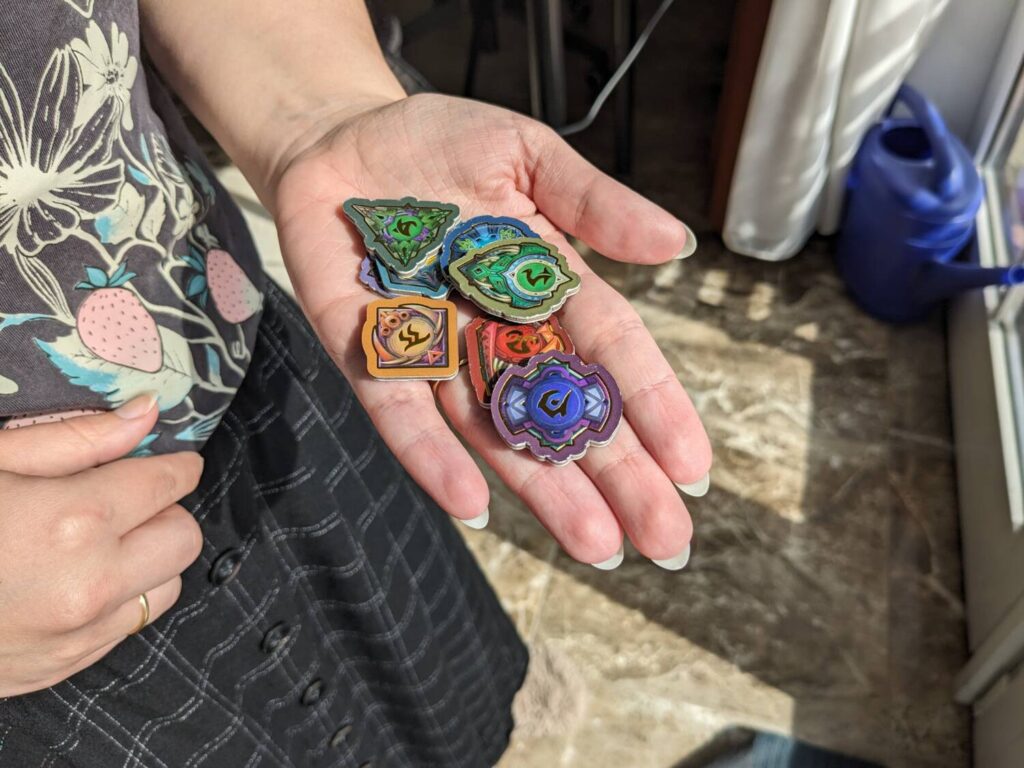
Dorka has been my main point of contact since I first met her, in part because she works closely with Soma Gál, the other community manager who also has the title “E-Commerce Manager” and the person who I typically see when I attend conventions. Since joining Mindclash in 2018, Dorka has been a steady presence. (Soma was out of the office on the day of my visit…since he was getting married the next day. Congrats, buddy!)
Dorka spent time abroad at university in Newcastle, earned two degrees, did agency-side PR and now does the comms for Mindclash as an internal employee. Dorka probably has the job that is easiest to understand for a layperson outside of tabletop: she has a hand in every form of external presence and communications, from writing copy to working with influencers to managing socials. She also helps lead the company’s convention/trade show presence.
Like some of the other staff members, Dorka would not call herself a gamer, even though she grew up playing CATAN, Agricola and Caverna. Terraforming Mars might be her favorite, “with ALL the expansions”, she says, while Anachrony and Septima are her favorite Mindclash games. (She does like to refer to some of the other junkies as “geeks”, but in a loving way.)
She loves working in the office. “I love the chatter…I come to the office twice a week and it’s great to work with colleagues in person. I love the after-lunch quiz time, and catching up with people as well.”
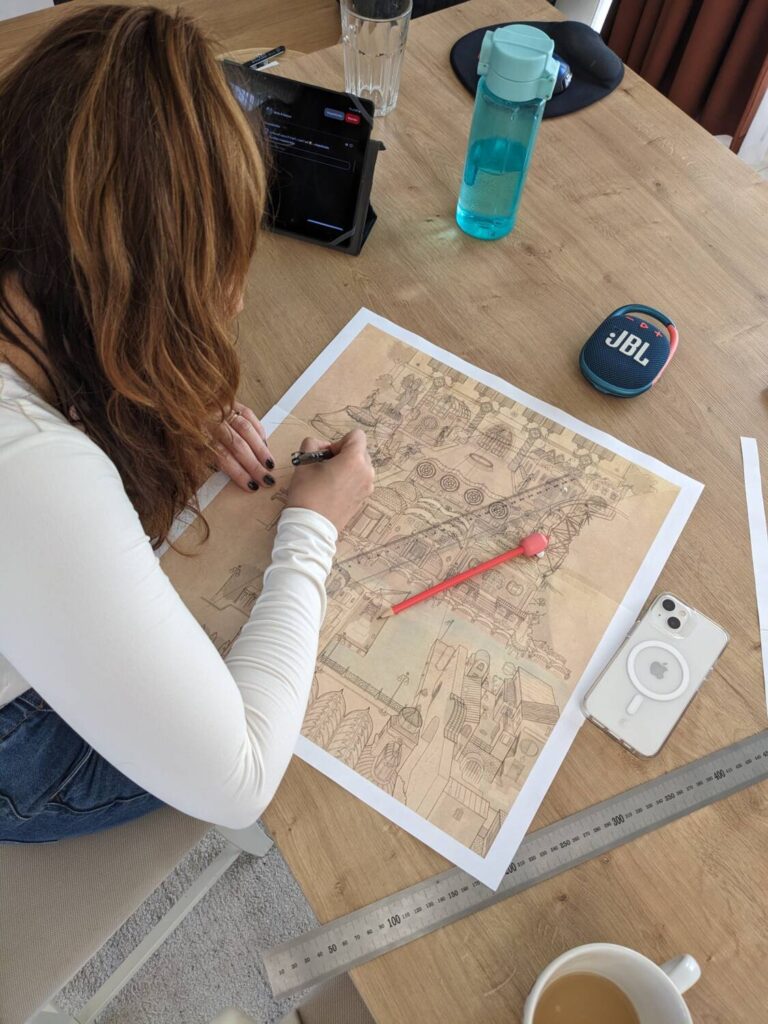
Villő is one of the “OG” staffers, someone who initially joined Mindclash part-time in 2014 when Viktor was working with Richard Amann on the initial design of Trickerion. Villő is a big personality—boisterous laugh, lots of opinions, laser-focused on helping visualize worlds in her unique style. Even when players don’t love a Mindclash game’s mechanics, they always seem to love the artwork. (Villő is the lead artist for most of Mindclash’s core titles.)
Villő might have the most multi hyphenate role with the team: she’s the art director, responsible for building consistency within a title and between Mindclash titles (meaning that even when Ian O’Toole was the lead artist and graphic designer for Voidfall, Villő worked with Ian to ensure the game had a “Mindclash feel”). She is the Scrum Master, serving as a project manager to help keep tasks on point.
Villő is also an illustrator who still finds herself sketching on a regular basis, and when I was in the office, she was working on a sketch of the alternative art for the Trickerion 10-Year Anniversary Edition. AI art has been a big topic of conversation over the last year or two, and when you get to watch someone like Villő at work, it becomes easier to see why people so passionately want to see only human-drawn art used in published work. And, it’s a blast to see people, you know, drawing! Villő’s art is a large part of what people love about Mindclash games, and when you see what goes into projects like Trickerion, it’s easier to commit to the idea of spending the money.
Villő has a lot of jobs, which is also why she loves it at Mindclash, 11 years after first quitting another job to join Viktor’s initiative full-time. “It’s really hard sometimes to balance all these internal roles, but I love all that comes with it. I don’t really have a normal day, so every day is a mix. At first, all I did was graphic design. Now it is everything, and as the art director, I really try to tie each game to every other game. I always want to put my heart into each game. That’s why I think fans really appreciate what we do.”
Villő loves Azul “because it is gorgeous and because it is very peaceful. I love the patterns too!” Like Dorka, Villő loves Septima. During a company brainstorming session, their collective passion for witchcraft and witch-themed films and art led to the team deciding on witches as the theme. “We really like having a mix of characters in our games because we, in our hearts, like to give players a chance to imagine themselves in each game. That’s why there is such a large mix of witches in Septima.”
I asked Villő about what inspires her, as it relates to her artistic style. “I want to find anything in my real life that I can incorporate into the game. Maybe it’s a poster or an art exhibition, something in terms of a theme that I am living with that I can push into a game.”
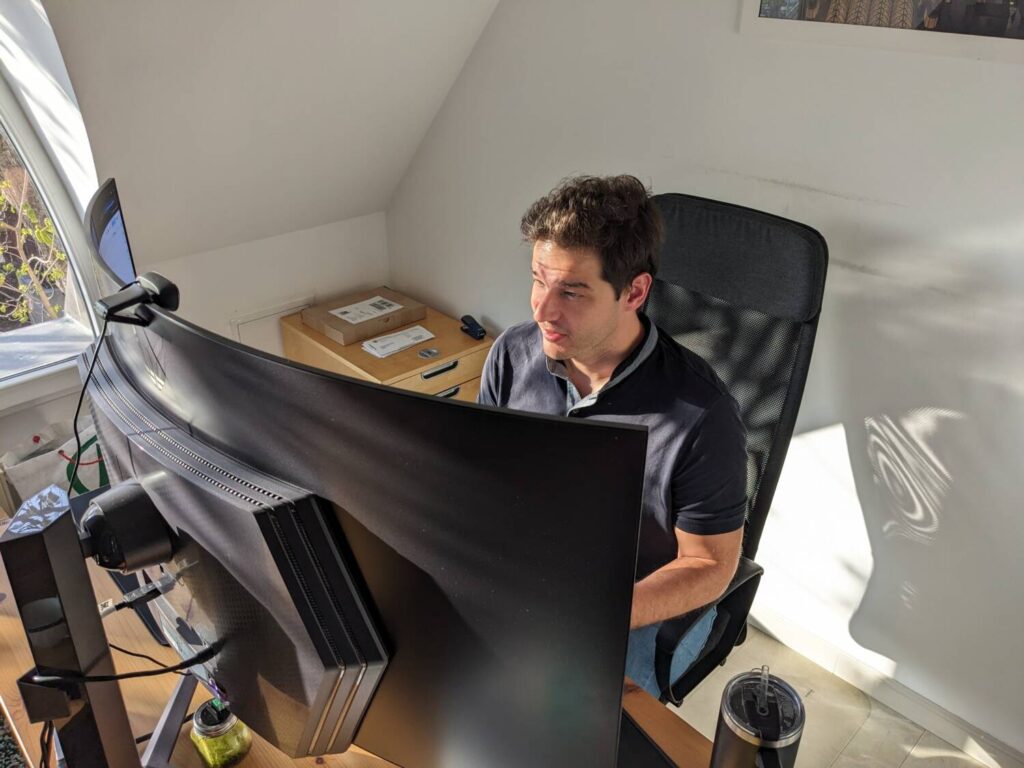
And, Viktor? Well, I’ve had the chance to chat with Viktor a few times, and we captured a lot of his background in my full profile from 2023. But for this visit, I spent an hour with him in the office and we talked about a lot of things—the state of the business, the games hitting the market this year, the fact that he cares about teambuilding the same way I do, knowing how important that is to creating a culture that makes people want to come back to work day after day in an environment full of, well, two-week sprints.
Viktor considers himself an introvert, so that quiet confidence has to translate in a way that inspires people. (Many of the publisher heads that I know come off this way.) A bit like David Chircop, the CEO and lead designer at Mighty Boards—a company that Mindclash aligns with in many ways—Viktor has a tricky job. I am sure he enjoys both the business elements and the design responsibilities that come with this job (his full-time focus for more than 10 years now), but I get the sense that he wouldn’t mind spending more time designing games.
Both when I first spoke with Viktor, and even now, Viktor only plays games occasionally. Netrunner is his all-time favorite, but Through the Ages is really close. “I can’t imagine ever getting the physical copy of Through the Ages to the table anymore, because the app is so good. I knew it would be good with Vlaada (Chvátil, the game’s designer who also happens to be the lead designer of Czech Games Edition), but it is almost too good…I can play a four-player game with three bots in 30 minutes!!”

The Future
I posed a question about the future of Mindclash to everyone I interviewed. Each and every one of them seems genuinely excited about what’s coming up.
“I think if you had asked me before all this with [the tariffs], I would have said that 2025 was going to be the best year in company history,” Viktor said. “I still feel positive, but I’m not sure what things will look like based on the US market.”
Mindclash, like many international publishers of big box tabletop games, counts on the buying patterns of American shoppers, especially in a world where $200-$300 deluxe editions comprise a decent amount of the market. So, the jury is out on how duties will affect prices and shipping for tabletop publishers, a narrative that changes on a daily basis.
In terms of the catalog, Mindclash has a lot in motion this year. Perseverance Episodes 3 & 4 will deliver late summer. Blaze will be ready in roughly the same timeframe. Trickerion will deliver around the end of this year, with Revenant delivering in 2026.
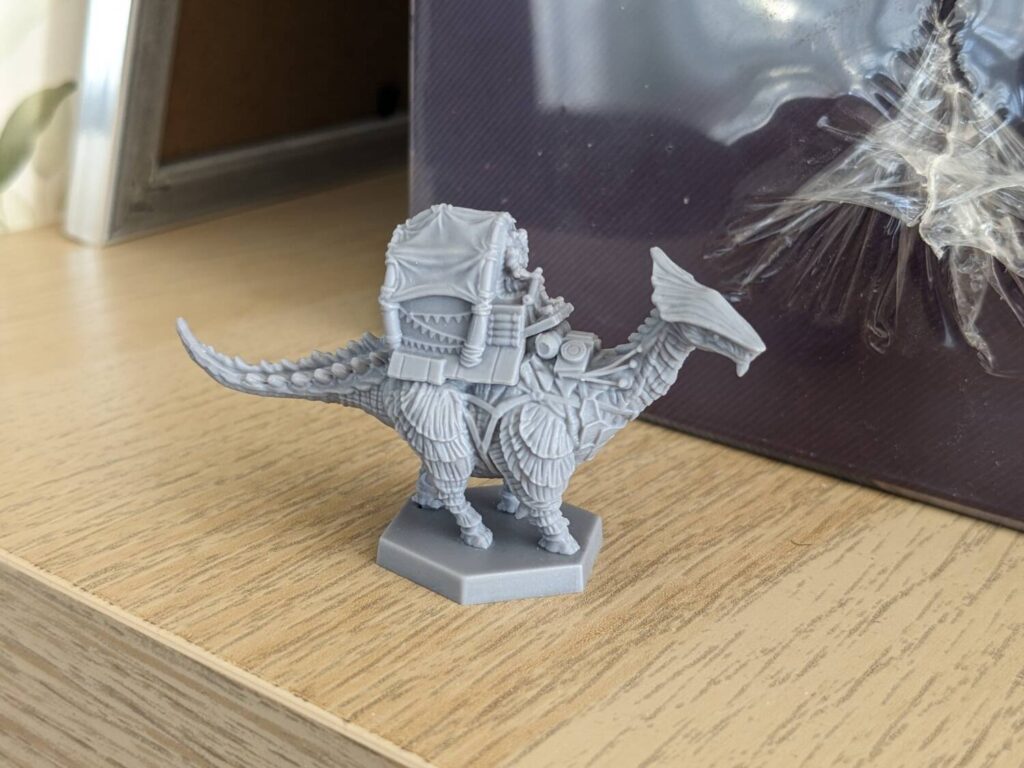
Viktor indicated that the Mindclash slate for 2026 is set, with another Mindclash Play title, the Voidfall expansion, and another title based on existing intellectual property that he wasn’t ready to share much about just yet. (I mean, both he and Dorka shared it with me, but I am sworn to secrecy. That has to count for something!) And Viktor just signed a core title for 2027 that was designed by…well, let’s just call the designers “famous” because that’s the word Viktor used.
Depending on the business environment for the year, Mindclash may or may not grow by a staff member or two. Boosting localization revenue is another goal that might help with growing the staff. Just a few months ago, Dorka began working with Natalia Pazar, a passionate member of the Mindclash community based in the UK, and now Mindclash has an ambassador program that Dorka hopes to kick off in other regions.
Mindclash will make appearances at its usual convention circuit: UK Games Expo, Gen Con, SPIEL, and possibly PAX Unplugged (a show Mindclash attended last year and may add to the rotation).
So, that was my visit. It was fun to see Mindclash up close, and hopefully, this article offered a glimpse of why it might be interesting to work in the tabletop industry and a bit about the business of the moment for a medium-sized publisher. I’m already excited to take my next trip to learn more about the business of tabletop.
And if you have ideas on what you’d like to see out of our new series, please offer feedback in the comments below. We will do our best to boost future content!
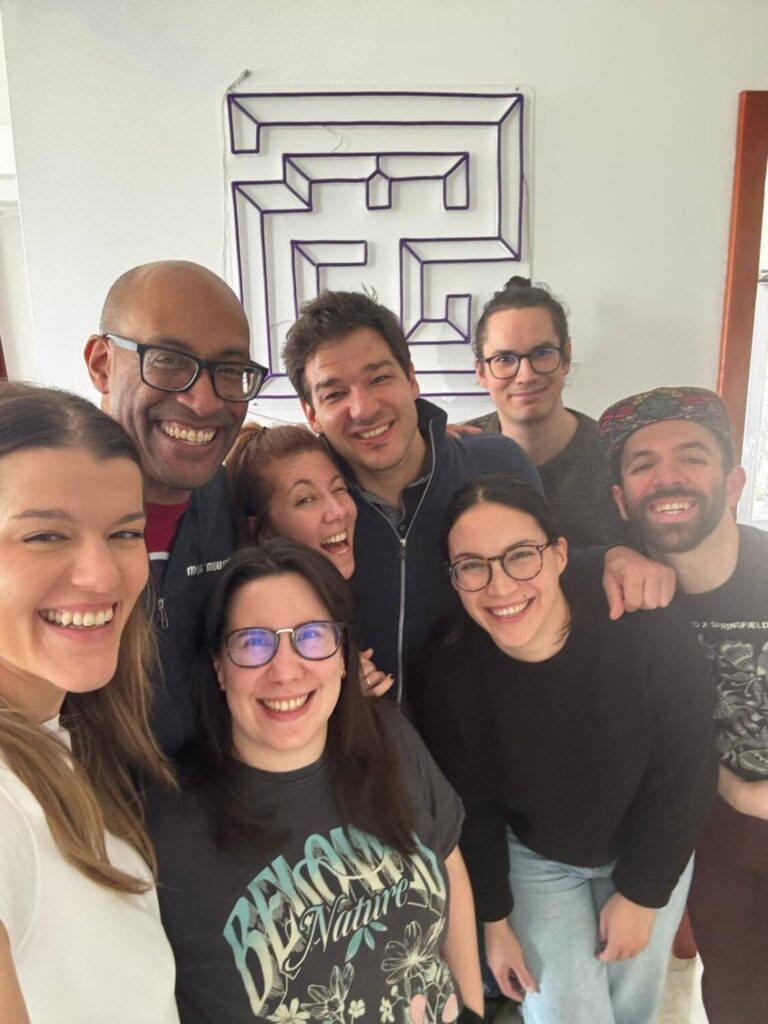


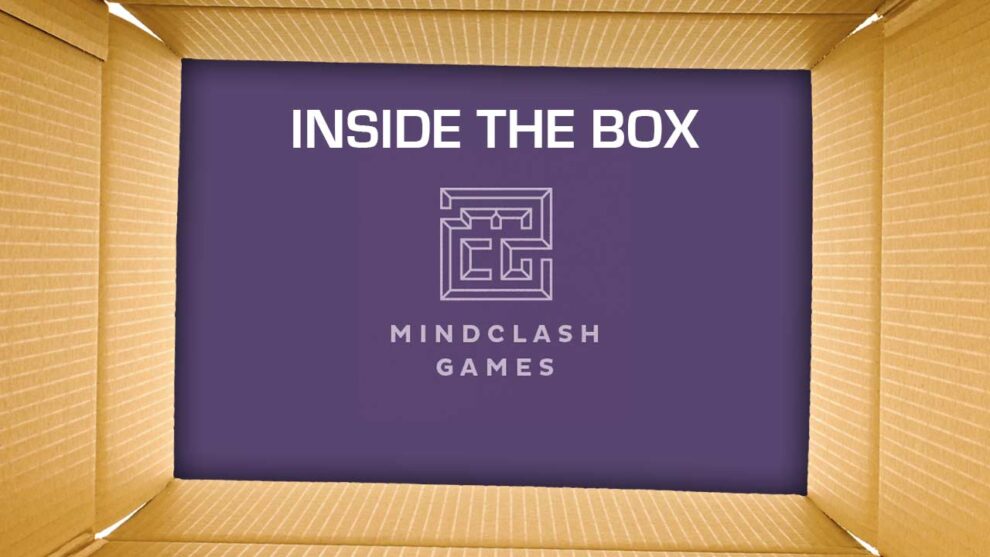
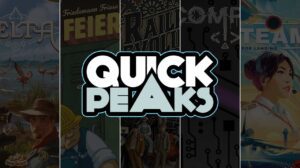
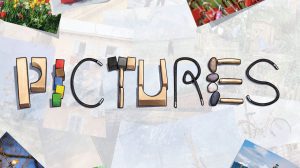
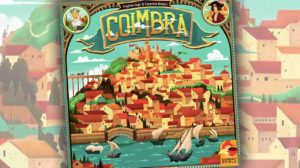
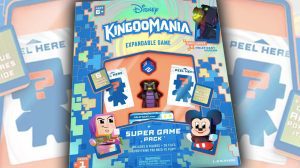




Add Comment